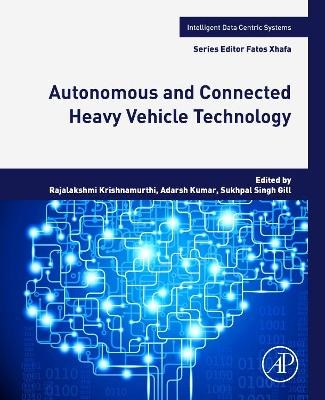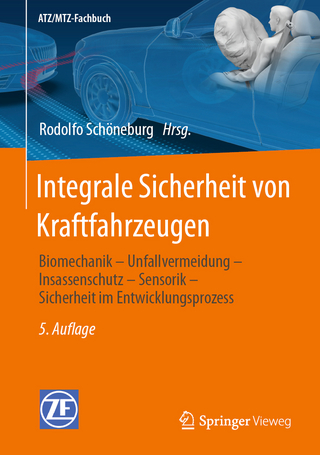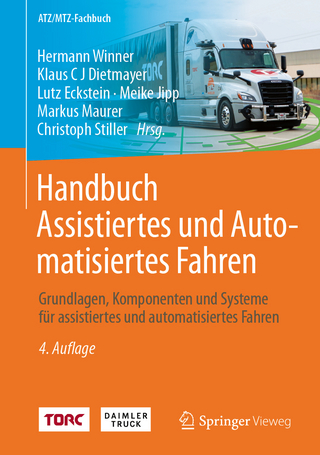
Autonomous and Connected Heavy Vehicle Technology
Academic Press Inc (Verlag)
978-0-323-90592-3 (ISBN)
The book also contains a wide range of case studies that help to identify research problems and an analysis of the issues and synthesis solutions. This essential resource for graduate-level students from different engineering disciplines such as automotive and mechanical engineering, computer science, data science and business analytics combines both basic concepts and advanced level content from technical experts.
Rajalakshmi Krishnamurthi is a Senior Member of IEEE, Professional Member of ACM, SIAM, IET and CSI. She is serving as Treasurer, Delhi ACM-W chapter. She is currently working as Assistant Professor (Senior Grade), Department of Computer Science and Engineering, Jaypee Institute of Information Technology, Noida, India. She has more than 17 year of teaching experience. She has more than 50 research publications in various reputed peer reviewed International Journal, Book Chapters, and International Conferences. Her research interest includes Internet of Things, Cloud Computing, optimization techniques in wireless mobile networks, e-learning applications using mobile platform and advanced fuzzy approaches. Dr. Adarsh Kumar is an Professor in the School of Computer Science with University of Petroleum & Energy Studies, Dehradun, India. He received his Master degree (M. Tech) in Software Engineering from Thapar University, Patiala, Punjab, India and earned his PhD degree from Jaypee Institute of Information Technology University, Noida, India followed by Post-Doc from Software Research Institute, Athlone Institute of Technology, Ireland. From 2005 to 2016, he has been associated with the Department of Computer Science Engineering & Information Technology, Jaypee Institute of Information Technology, Noida, Uttar-Pardesh, India, where he worked as Assistant Professor. His main research interests are cybersecurity, cryptography, network security, and ad-hoc networks. He has many research papers in reputed journals, conferences and workshops. He participated in one European Union H2020 sponsored research project and he is currently executing two research projects sponsored from UPES SEED division and one sponsored from Lancaster University. Dr. Sukhpal Singh Gill is a Lecturer and Assistant Professor in Cloud Computing at the School of Electronic Engineering and Computer Science, Queen Mary University of London, UK. Prior to his present stint, Dr. Gill has held positions as a Research Associate at the School of Computing and Communications, Lancaster University, UK and also as a Postdoctoral Research Fellow at CLOUDS Laboratory, The University of Melbourne, Australia. Dr. Gill is serving as an Associate Editor for Wiley ETT and IET Networks Journal. He has co-authored 100+ peer-reviewed papers and has published in prominent international journals and conferences such as IEEE TCC, IEEE TSC, IEEE TII, IEEE TNSM, IEEE IoT Journal, Elsevier JSS/FGCS, IEEE/ACM UCC, and IEEE CCGRID. He has received several awards, including the Distinguished Reviewer Award from SPE (Wiley), Best Paper Award AusPDC at ACSW 2021, and has also served as the PC member for venues such as PerCom, UCC, CCGRID, CLOUDS, ICFEC, AusPDC. He has edited research books for Springer, Elsevier and CRC Press. His research interests include Cloud Computing, Fog Computing, Software Engineering, Internet of Things and Energy Efficiency. Fatos Xhafa, PhD in Computer Science, is Full Professor at the Technical University of Catalonia (UPC), Barcelona, Spain. He has held various tenured and visiting professorship positions. He was a Visiting Professor at the University of Surrey, UK (2019/2020), Visiting Professor at the Birkbeck College, University of London, UK (2009/2010) and a Research Associate at Drexel University, Philadelphia, USA (2004/2005). He was a Distinguished Guest Professor at Hubei University of Technology, China, for the duration of three years (2016-2019). Prof. Xhafa has widely published in peer reviewed international journals, conferences/workshops, book chapters, edited books and proceedings in the field (H-index 55). He has been awarded teaching and research merits by the Spanish Ministry of Science and Education, by IEEE conferences and best paper awards. Prof. Xhafa has an extensive editorial service. He is founder and Editor-In-Chief of Internet of Things - Journal - Elsevier (Scopus and Clarivate WoS Science Citation Index) and of International Journal of Grid and Utility Computing, (Emerging Sources Citation Index), and AE/EB Member of several indexed Int'l Journals. Prof. Xhafa is a member of IEEE Communications Society, IEEE Systems, Man & Cybernetics Society and Founder Member of Emerging Technical Subcommittee of Internet of Things. His research interests include IoT and Cloud-to-thing continuum computing, massive data processing and collective intelligence, optimization, security and trustworthy computing and machine learning, among others. He can be reached at fatos@cs.upc.edu. Please visit also http://www.cs.upc.edu/~fatos/ and at http://dblp.uni-trier.de/pers/hd/x/Xhafa:Fatos
SECTION 1 Review articles 1 Lightweight and heavyweight technologies for autonomous vehicles: A survey 2 Cybercrimes and defense approaches in vehicular networks 3 Autonomous driving systems and experiences: A comprehensive survey 4 Applications of blockchain in automated heavy vehicles: Yesterday, today, and tomorrow 5 Eco-routing navigation systems in electric vehicles: A comprehensive survey
SECTION 2 Implementation or Simulation-based study for heavy vehicles technologies 6 Automatic vehicle number plate detection and recognition systems: Survey and implementation 7 A secured IoT parking system based on smart sensor communication with two-step user verification 8 Man-and-wife coupling and need for artificially intelligent heavy vehicle technology in The Long, Long Trailer 9 Pulse oximeter-based machine learning models for sleep apnea detection in heavy vehicle drivers 10 Using wavelet transformation for acoustic signal processing in heavy vehicle detection and classification 11 Congestion control mechanisms in vehicular networks: A perspective on Internet of vehicles (IoV) 12 Smart traffic light management system for heavy vehicles 13 Smart automated system for classification of emergency heavy vehicles and traffic light controlling 14 Implementation of a cooperative intelligent transport system utilizing weather and road observation data
SECTION 3 Applications and case studies for heavy vehicles technologies 15 Heavy vehicle defense procurement use cases and system design using blockchain technology 16 Cybercriminal approaches in big data models for automated heavy vehicles 17 Modeling fuel economy of connected vehicle based on road dynamics and driving style 18 Conceptual design and computational investigations of fixed wing unmanned aerial vehicle for medium-range applications 19 Multi-sensor fusion in autonomous heavy vehicles 20 Smart vehicle accident detection for flash floods
| Erscheinungsdatum | 28.01.2022 |
|---|---|
| Reihe/Serie | Intelligent Data-Centric Systems |
| Mitarbeit |
Herausgeber (Serie): Fatos Xhafa |
| Zusatzinfo | Approx. 200 illustrations (200 in full color); Illustrations |
| Verlagsort | Oxford |
| Sprache | englisch |
| Maße | 191 x 235 mm |
| Gewicht | 950 g |
| Themenwelt | Technik ► Fahrzeugbau / Schiffbau |
| ISBN-10 | 0-323-90592-7 / 0323905927 |
| ISBN-13 | 978-0-323-90592-3 / 9780323905923 |
| Zustand | Neuware |
| Haben Sie eine Frage zum Produkt? |
aus dem Bereich


